- Home
- Lloyd Jones
See How They Run Page 4
See How They Run Read online
Page 4
They would see it all.
III
Lou was in bed with Catrin, lying with his head parked lightly on her bubble. He was intrigued by the hidden scene inside her; their little bald actor, with his cummerbund placenta, alone in his dressing room, waiting patiently for the five-minute call. It was just amazing the way you could effect a rough docking, like a couple of play-doh spaceships hitting turbulence, and nine months later you’d have another version of the eternal drama, ready to appear in a slightly different provincial theatre. Lou was excited and intrigued by the activities within. Pregnancy had been good for them both. Catrin looked wonderful and Lou was going to be a good father – he’d said it and he meant it. Then his rampant hormones got the better of him for a second time that morning; fortunately, Catrin was just as horny herself. When they were at it, in medias res, he thought of the girl in the dragon hat on the ferry and momentarily lost his rhythm. What a shit he was. Later, after a breakfast of toast and marmalade – they’d run out of milk for cereal, thanks to Catrin’s urges – he went to the shops for some emergency supplies, then set off for West Wales and the reunion with himself at Hotel Corvo. A foreign-sounding female voice had laughed lightly at the other end of the line when he’d phoned to book.
Plenty of roomz zir, yez vi haff plenty ov roomz right now.
Perhaps he should have stayed in the village and snuck up to the hotel at night, as he’d done as a teenager, but he couldn’t be bothered. When he entered the coastal belt a thick white mist was rolling in off the sea and cars were driving on full headlights. He switched on his rear fog lamp and wondered why it gave him such childish pleasure to do so; it was something one did so rarely in life, and there was a slight sense of virtuousness and righteousness, of reacting nobly in a challenging situation. The road wasn’t quite as he remembered it and the journey took longer than he’d anticipated, so evening was drawing on by the time he arrived. Hotel Corvo was smaller than he remembered, of course, and much the worse for wear. Despite this, he wasn’t disappointed. He’d looked forward to coming back, though he knew the dangers of expectation, and as a precaution he’d deliberately dampened his hopes in advance. So it was nice to take his blue BMW through the curves of the driveway, and to enjoy the tilts and timbres of the narrow road leading up to the hilltop. The rooks or jackdaws were cawing their way towards bed as he closed the lid of the boot and made his way to reception. It didn’t take him long to establish that the hotel was an empty and decaying ghost ship ploughing her way through heavy seas; at the edge of the world now, ready to topple over the precipice.
He’d arranged for a member of staff to take him straight to the village and off they went as soon as he’d dumped his hold-all in his room. Down in the white-shrouded bay he skirted the rocks and went out to the tideline, so that he could savour the salty air again and let the scene stir his memory. The mist enveloped him and he felt cool and distant and isolated. He listened for foghorns, but his invisible world was completely silent as droplets of vapour began clinging to his pullover and hair. A bell clanged distantly, and a heron shrieked from the direction of the marshes.
He’d been sixteen when they came here, Lou and his freckly ma. While she worked as a barmaid at Hotel Corvo he’d spent the summer making friends, discovering sex and dope and cheap booze, surfing and spending all night in the woods with other kids, exploring each other around campfires, popping some pills and getting dizzy. Then they’d left, as suddenly as they came, when the season ended. His ma had been quiet, depressed, perplexed. She never was the same again – she put on a lot of weight and didn’t bother with her looks any more. Something happened to her that summer at Hotel Corvo.
Lou walked up through the village, which was much the same as it was in his youth. More holiday homes perhaps, they looked tidier and better cared for than the rest. The shop and post office had shut, as per normal, and one of the chapels had closed, new dormer windows giving it a fresh view of the holy kingdom.
Up he went, slowly, looking out for landmarks; the hollow tree where he’d hidden his swimming gear and bottles (tree still there, but no bottles) and a slat in a slate fence onto which he’d carved a girl’s name; Ross Smedley, his second great passion that year (the name was still there, but the slender girl he remembered had been swallowed by the void, probably married with kids now, leaving a strange longing inside Lou). His first summer of love came back to him as steadily as the waves crashing in the mist below. Hard goosepimples on experimental young skin, fumbled flesh, electricity fizzing through his fingers as the AA bra or bikini top eventually came undone. Week-long snogs. Volcanic brain movements and a near-constant hard-on. Wonderful, amazing days. And every evening, his skin still tingling, his hair damp and his feet slopping about in a pair of pumps which he was meant to grow into, he’d stalk uphill towards Hotel Corvo, to mingle among the men in the public bar, pretending to be one of their sons. After the initial gambit came off he became a regular, though the bar staff knew well enough he wasn’t eighteen, turning a blind eye because they knew his ma worked upstairs. It was a time when pubs were at their most popular, operating at full capacity. They were still a way of life for most people, places where they went to be social, to look for sex and to find work. They’d been the country’s social centres since the chapels and churches emptied. The men played the old games, darts and dominoes, and there would always be one who’d start to sing in a wayward tenor voice towards the end of the night. Men still whistled then. Girls would sit tentatively with girly drinks, their cashmere pullovers draped over their shoulders and smudges of lipstick on their glasses. Drinks had nicknames like snakebite or leg-opener. Even in the daytime the place would be bustling with men in transit between jobs, or taking a break from home duties, or drinking their holidays away. There was always a healthy interaction between the generations, not like today’s scene with a bored barmaid reading a magazine, a few oldies ignored in the corner and a big open space, then some kids being moody with a cheap bottle of vodka hidden away in a bag. Lou called them the Friends generation because they just wanted to be in their own little TV sitcom modelled on the American product; it was what they aspired to – cool banter in a cool place, a bunch of schmucks livin’ the dream. The camera was always on them.
He approached the hotel with a frisson travelling through him, and he dropped his shoulders like a cat-burglar as the hulk of the building began to loom overhead. A row of lights, coming from the downstairs bar, lured him onwards. The place was much quieter now; there was no hubbub coming from inside, no cars coming and going. He peered into the long window which fronted the building and saw nothing at first, just a sea of empty tables and chairs; but when his eyes reached the long mahogany bar, over against the far wall, his eyes registered a series of silhouettes leaning against the woodwork. Amazingly, he recognised them all from the rear, by their shapes. Like seven old mythological beings or Easter Island statues carved in stone, they were still there: each outline stepping up or down against the yellow burr of the bar lights, a mountain range of dark blue hills set against the late evening light. He knew them all by their stance and their body talk; a lifetime’s mannerisms had been condensed into a slouch here or a stoop there. They were the survivors; everyone else in that bar had disappeared into the mist outside, or into the mists of time, but these last stragglers had defied statistics and probability; they’d survived the many winters which separated them all from Lou. The rest had gone. None of those hulks should have been there; they’d smoked and drank and caroused and misbehaved enough for a thousand men, but they’d got away with it. Strange, how it worked out, thought Lou. You never knew who’d last the years, but you always had a suspicion. The human life force seemed to have an atomic quality to it, discernible in passing bodies; a sort of quantum tweeting by the pheremones.
Lou crept stealthily towards the bar, hoping to surprise them, but he should have known better; what those men had, more than anything else, was a supersensitive perception of their e
nvironment. One of them, he remembered, could chat to you engagingly while simultaneously listening to many other conversations going on around him, as if he were a listening device. It was quite unbelievable what he could pick up. As a result he was a walking encylopaedia of local gossip, going back to the birth of the village; indeed, through hearsay and rumour he could return, vicariously, to the dawn of local history. At the same time as his ears swivelled to and fro his clever, knowing eyes were scanning the scene for any additional material which might reinforce his aural intake. He was a plasterer by trade, doing just enough work every morning to fund his drinking for the rest of the day; and since he’d worked in almost every house in the vicinity during his lifetime, he could localise all the information coming his way, room by room. Add to this a formidable memory, and what you had was a data bank matching the national archive at Kew.
They’d had sex lives to match the rich and famous; if the OS maps had carried symbols for their mating spots instead of castles and churches the landscape would be cluttered with their insignias. It wasn’t that they were crude bucolic casanovas; for a start, they’d lived for a long time and had known lots of women. It was more than that: they had charm, yes natural homegrown charm. A bit threadbare now, perhaps, but still discernible in the way they gave you their sincere and undivided attention when you were with them – a perfectly natural form of flattery. And here they were, like a coven of old spiders, huddled up in a corner trying to avoid the painter’s brush, hiding from the fresh paint of time and change. That wasn’t mist he could see through the window, thought Lou, it was a glistening band of silky strands stretching out towards every bedroom in the vicinity, because they’d all wandered away from their own webs many times; they were loopy oversexed spiders who didn’t know the confines of the average cobweb.
So they greeted him now, softly, bought him a drink and made a fuss of him in their old-fashioned way, because they knew exactly who Llwyd McNamara was since the moment they saw a BMW climbing the foggy hill to Hotel Corvo.
Maureen’s son, isn’t it? said one of them in his sea-cave voice, but he wasn’t asking, he knew. Western shores bred such men all over the world. Shy, diffident and subdued, but self-sufficient and resourceful. Gifted in unexpected ways and full of small wonders, like the rockpools below. Quick-witted and droll, but essentially sad. After all, the sea itself was basically sad. Small sun-burnt faces framed in the windows of departing cars at the end of fine summer days had something to do with it, perhaps. Or maybe it was the sea’s parental moods – they made you wary after a while. Shorelines had a liminal sadness about them because you’d look at a group of kids playing on the sand and you’d be there yourself immediately, the beach was such a communal experience, but one of those kids was always you and you’d see how time passed, you’d see right into the mechanism of time, it was like looking into a watch and seeing a tiny version of yourself walking along the rim of a cog; you’d feel sad, and your own tristesse would be added to a communal melancholia which festered in the creeks and pools and lodged in barnacle clumps on the rocks all around you. You’d see yourself being eroded in step with the cliffs and the bays; here at the edge of the world you saw yourself slipping away. The shore was a playground for children but it was a graveyard for memories. Life always ended with your own Titanic going down near the shore – but instead of the orchestra playing you’d hear your own memories scratching away at the porthole windows.
Those shipwrecked men in the bar at Hotel Corvo, they all remembered Maureen the freckled Irish girl for various reasons, but there was one communal memory which they wouldn’t share with her son, on compassionate grounds. Once, Maureen had got drunk at the bar, after a shift, and something had happened. An embarrassing episode, followed by a scene. These men had seen it all, witnessed Maureen being exposed and compromised. The male involved – Leda to her swan – had been the manager of the bars, Big M himself, who knew they were being watched. It wasn’t that he was an exhibitionist, it was just that he didn’t care. Women couldn’t and didn’t try to resist him; sex was part of his daily diet, like food and drink. Everyone knew that, even his regular girl, Rhiannon.
Morality seemed to fall asleep whenever he opened his flies. He joked about it, and nobody seemed to mind. He’d pour himself a drink, raise his glass, pose ridiculously with his chest out, and say I’m a Sex God you know. He could say it in a way which was cheesy and funny and a bit sad too, but never really offensive, and in not trying to get away with it he got away with it. Big M was a sex god. In the misty, numinous world of Hotel Corvo, nobody cared. His libido came and went with the tide. After a while, they didn’t even notice it.
Lou leant against the bar, by now an eighth silhouette in the mountain range. He felt at home with these men, despite all the differences. He suspected that they knew something he didn’t – he’d picked that up when he was a kid. It was partly the reason for being here. They shared rounds and he started to feel drunk, because he hadn’t had any food. No one else came in – this bar at the end of the universe was just for them, it seemed.
‘So what happened to Big M, the rugby hero who ran the bars?’ asked Lou while he was quizzing them about all the old faces.
‘He just disappeared,’ said the man by his side. None of them was particularly forthcoming, since they were all re-running their clips of Maureen, tearstained under her tousled red hair.
So Lou made his excuses and sidled off to the restaurant to get some food inside him before he got sloshed. He was the only one in there, and when the food arrived he realised why. Still, it filled a hole. He felt morose by now, sad that this place was on its last legs, like so many of Britain’s pubs and hotels. The breathalyser had started the decline, and greedy middle men had syphoned off more and more, so that drinking out had become an expensive hobby. Then television came to hypnotise the populace, and the computer screen, so that in no time at all the British were a nation of post-modernist zombies living a virtual life, most of it set in America. The roads were deserted, the land was empty. If you walked along a street at dusk before they closed their curtains you’d see them all sitting there, fettered to their bargain sofas, mesmerised by mediocrity. How supine they’d all become, thought Lou, they were just a bunch of pets with their paws in the air, waiting for their cable-powered masters to feed them a morsel or stroke their tums. How sad, how tragic that these places were empty – the robust universities of the poor, closed down and boarded up. All that humour and badinage gone, atomised into vapour inside a time capsule.
Knowing that he’d only delayed drunkenness, Lou returned to the bar and rejoined the shadows leaning against it. Although they must have downed another couple of rounds they were none the worse for it. Maybe that’s why they’d survived for so long, thought Lou, they’d all paced themselves, and the pace had been fast all along. Life had been a marathon drinking session, interspersed with a few hours’ work here or there to finance it.
One of them, a carpenter who made a fortune by painting distressed repro seascapes and selling them to the gullible, sat down at a nearby table to take the weight off his legs. Lou joined him in the roseate gloom, and they sat together comfortably on a settle running along a wall, with their backs to the faded crimson upholstery – Lou recognised its distinctive smell, beery and dusty. Drunk by now and chasing a double whiskey, he quizzed the carpenter about the consumptive decline of Hotel Corvo. He wanted to know why his ma had come here, but he was sensible enough to scout around the issue. The carpenter was happy to tell him the background story as he knew it.
Going back a generation, the hotel had fallen on hard times when the entrepreneur who’d built it died. Then a local lad, Pryderi, had bought it. No one knew how he’d got the money together, but everyone assumed that the spondooliks had come from his burgeoning rugby career. He went on to play for Wales, said the carpenter, and he pointed to a row of photographs on the far wall, as if Lou didn’t know about them already. Pryderi became the main man in the region
, a bit of a lad and a general wheeler-dealer. Fancied himself. Girls, fast cars, friends on the council, dodgy deals. After he’d come back from Ireland with his team mate Big M, things really took off at the hotel. They built it up and, helped along by their good looks, charm, and legendary reputations, they turned the place into a goldmine.
But enough wasn’t enough for Pryderi, said the carpenter. His wife Ziggy had been an ambitious little missy, cunning and devious. One of those clever little working-class girls who’d erased their accents and made the most of their abilities; they dressed well in an understated way, and found a guy who could make money. Pryderi was ideal: she’d pointed him in the right direction and urged him on. But somewhere along the line they’d over-extended, got into financial bother. And instead of going through the usual channels, Pryderi had gone underground for money. There had been regular trips across the border: first to Kent, then to Oxford. Every time he came back he was different; his moods became blacker, his silences longer. He’d sit at a table outside, looking at the sea, and he’d drink himself into a stupour.
Loan sharks? asked Lou.
Maybe, said the carpenter. But a carful of men had descended on Hotel Corvo one afternoon, quiet men in expensive suits, dark and sleek, and they’d had Irish accents. Coincidence maybe, but from that day onwards the silhouettes at the bar had never discussed the issue again in public, because they’d all thought of the same outfit when they saw those men – the IRA.
You sure about that? asked Lou.

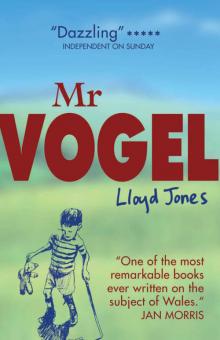 Mr Vogel
Mr Vogel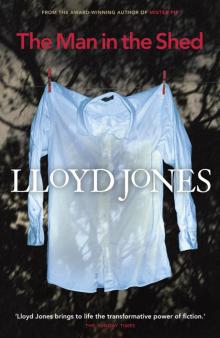 The Man in the Shed
The Man in the Shed Mister Pip
Mister Pip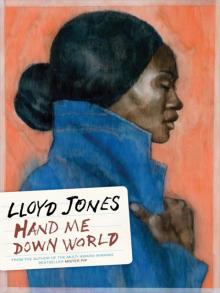 Hand Me Down World
Hand Me Down World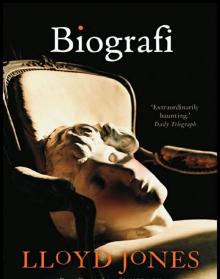 Biografi
Biografi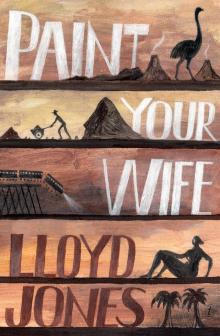 Paint Your Wife
Paint Your Wife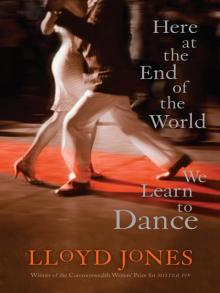 Here at the End of the World We Learn to Dance
Here at the End of the World We Learn to Dance My First Colouring Book
My First Colouring Book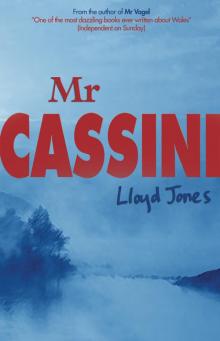 Mr Cassini
Mr Cassini See How They Run
See How They Run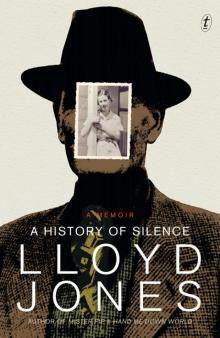 A History of Silence
A History of Silence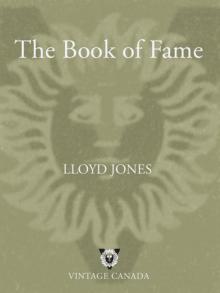 The Book of Fame
The Book of Fame